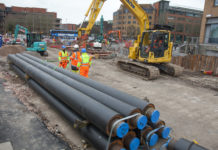
Dave Cockshott, chief commercial officer at Inenco, asks why energy took a back seat at this autumn’s political party conferences.
Ahead of the general election, this autumn’s party conference season was a chance to hear where the priorities of each party lie, and policies we should expect to hear more about during their election campaigns.
Last year’s conference season was a bumper one for energy. Labour surprised us all with their announcement of an immediate energy freeze should they be elected in 2015. The Tories responded with their commitment to cut “green taxes”, taking £50 off the average domestic bill and sending the insulation industry into disarray but doing not very much for business energy use.
Energy became last autumn’s political football, with each party vowing to keep prices down and tackle the so-called “huge” profits of energy suppliers, and a suite of initiatives rolled out in an attempt to appease consumers.
With baited breath, we waited to hear where energy would feature on the agenda this year. The answer? Far down the agendas for each party, with no real developments to report. But why?
Both Labour and the Liberal Democrats proposed domestic energy efficiency measures, but there was no mention of its importance to British industry. The Conservatives talked about the need to bring forward investment in shale gas and ensure renewables deliver “best value” for taxpayers but offered no further detail.
Labour insisted that freezing prices out to 2017 would allow them time to fix the “broken” market, but offered no further detail about how the price freeze would actually work. Many in the market believe such political uncertainty could well cause prices to shoot up ahead of the election as suppliers lock out volume – and liquidity in the market could also be damaged. Faced with such criticism of an “unworkable” policy, where was the detail? They also affirmed commitment to 2030 decarbonisation targets – but how would this be delivered?
Energy quite literally fuels our economy, and the lack of focus on it concerns me.
The billions of pounds of investment in both generation and energy efficiency is one of the UK’s biggest infrastructure challenges. The cost of energy impacts the corner shop as well as the factory, and thousands of households and businesses alike struggle with the effect of rising energy bills.
If there’s one thing that’s certain in energy, it’s the need for certainty. Whether it’s investment in energy efficiency or new generation capacity, one thing we all need is a stable environment. Long-term stability will provide the right climate for investors to build assets that will outlive the term of several governments. It also enables businesses to plan beyond a couple of years, safe in the knowledge that they won’t be hit with unexpected policy and costs.
Energy isn’t a fair-weather issue. The potential instability caused by a change in government threatens the ability to deliver investment, the price we pay for energy, and the ability of industry to compete in a global market. Over the coming months, we need a commitment from across the political spectrum recognising the need for stability and, above all else, recognition of the importance of energy to UK plc.
The article first appeared as a sponsored column in the October/November print issue of Water, Energy & Environment under the headline ‘Let’s put some energy back into politics’. Click here to see if you qualify for a free subscription.



